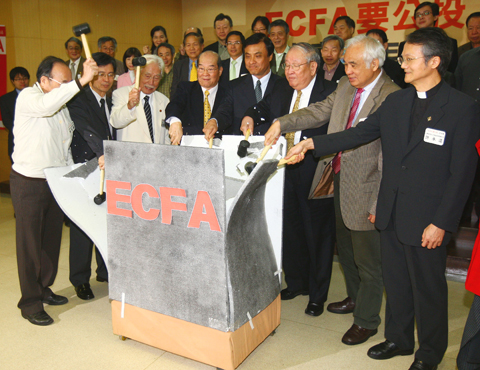The Taiwan Solidarity Union (TSU) and 50 pro-independence groups yesterday launched a referendum drive against the government’s proposed economic cooperation framework agreement (ECFA) with China, vowing to stop President Ma Ying-jeou (馬英九) in his tracks.
TSU Chairman Huang Kun-huei (黃昆輝) told a press conference that the party would arrange 24 locations nationwide to collect signatures for the petition. He called on the public to stand up and express their opinions on this important issue.
“A referendum on the ECFA proposal is the last chance to defend Taiwan’s democracy. President Ma has said he is not qualified to be president of the nation if the ECFA is not signed. Let us not allow him to be the president,” Huang said.

PHOTO: CNA
He said the referendum would ask voters to state “whether they agree that the government should sign an economic agreement with China.”
While saying that the statement was clear and simple, Huang said he believed the Executive Yuan’s Referendum Review Committee had no reason to refuse the referendum proposal.
He said that once the TSU has completed the first phase and gathered 86,000 signatures, the petition would be sent to the government for review, meaning the proposal would be entered legally and the ECFA, if signed, would not take effect until the referendum was completed.
The action marks the TSU’s second referendum drive, following one last year conducted by the Democratic Progressive Party (DPP) that was rebuffed by the committee despite having passed an initial Central Election Commission review.
The committee turned down the petition on the grounds that it was based on a hypothetical situation that did not meet the criteria set out in the Referendum Act (公投法).
DPP Secretary-General Su Jia-chyuan (蘇嘉全) told a press conference that the party fully supported the measure, adding that the DPP would motivate party officials and members to promote the petition, and hoped that the first stage could be completed in a month.
Former vice president Annette Lu (呂秀蓮) criticized the ECFA, saying it would belittle Taiwan’s sovereignty and harm Taiwan’s interests.
“As a responsible head of the nation, Ma should adopt the WTO model and try to sign a free-trade agreement [FTA] with China, not belittle the nation by accepting the model for Hong Kong’s Closer Economic Partnership Arrangements,” Lu said.
She accused Ma of neglecting his duties as president.
“Ma has said other countries would sign FTAs with Taiwan after the country signs the ECFA with Beijing, but in fact there is no chance for Taiwan to sign FTAs with other countries once the economic pact with Beijing is signed,” she said.
Former US diplomat John Tkacik said he had observed that countries in Southeast Asia had not profited after they signed FTAs with China. Farmers in Thailand thought their products would be exported to China under such an economic treaty, but after it was approved Thailand’s markets were flooded with Chinese agricultural goods.
Tkacik also added his concerns that Taiwan might become a special administrative region of China, and Taiwan’s sovereignty and survival would be seriously challenged if the country signed the ECFA with Beijing.
Former presidential advisor Koo Kwang-ming (辜寬敏), World United Formosans for Independence chairman Ng Chiau-tong (黃昭堂), and head of the Hand-in-Hand Taiwan Alliance, Yao Chia-wen (姚嘉文) also attended the press conference.

Taiwanese can file complaints with the Tourism Administration to report travel agencies if their activities caused termination of a person’s citizenship, Mainland Affairs Council Minister Chiu Chui-cheng (邱垂正) said yesterday, after a podcaster highlighted a case in which a person’s citizenship was canceled for receiving a single-use Chinese passport to enter Russia. The council is aware of incidents in which people who signed up through Chinese travel agencies for tours of Russia were told they could obtain Russian visas and fast-track border clearance, Chiu told reporters on the sidelines of an event in Taipei. However, the travel agencies actually applied

Japanese footwear brand Onitsuka Tiger today issued a public apology and said it has suspended an employee amid allegations that the staff member discriminated against a Vietnamese customer at its Taipei 101 store. Posting on the social media platform Threads yesterday, a user said that an employee at the store said that “those shoes are very expensive” when her friend, who is a migrant worker from Vietnam, asked for assistance. The employee then ignored her until she asked again, to which she replied: "We don't have a size 37." The post had amassed nearly 26,000 likes and 916 comments as of this

New measures aimed at making Taiwan more attractive to foreign professionals came into effect this month, the National Development Council said yesterday. Among the changes, international students at Taiwanese universities would be able to work in Taiwan without a work permit in the two years after they graduate, explainer materials provided by the council said. In addition, foreign nationals who graduated from one of the world’s top 200 universities within the past five years can also apply for a two-year open work permit. Previously, those graduates would have needed to apply for a work permit using point-based criteria or have a Taiwanese company

The Shilin District Prosecutors’ Office yesterday indicted two Taiwanese and issued a wanted notice for Pete Liu (劉作虎), founder of Shenzhen-based smartphone manufacturer OnePlus Technology Co (萬普拉斯科技), for allegedly contravening the Act Governing Relations Between the People of the Taiwan Area and the Mainland Area (臺灣地區與大陸地區人民關係條例) by poaching 70 engineers in Taiwan. Liu allegedly traveled to Taiwan at the end of 2014 and met with a Taiwanese man surnamed Lin (林) to discuss establishing a mobile software research and development (R&D) team in Taiwan, prosecutors said. Without approval from the government, Lin, following Liu’s instructions, recruited more than 70 software